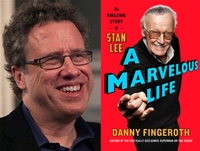Superman on the Couch: What Superheroes Really Tell Us about Ourselves and Our Society
Danny Fingeroth. Continuum, $26.95 (192pp) ISBN 978-0-8264-1540-0
The golden age of comic books may be over, but our""hope (and fear) that there may be more to this world than what we see"" draws us to pop culture heroes who mesh otherworldly powers and smarts with a sense of duty and even some human frailty. This is part of a global""superhero comic consciousness"" that, observes Fingeroth, transcends religious and national boundaries to infect us with do-gooder inclinations while still letting us delight in violent retribution against imagined villains. Connecting the dots from ancient warriors and biblical figures to modern-day superheroes, Fingeroth analyzes archetypes like the angry young man (Wolverine), the avenging orphan (Batman), the dual personality (Superman) and other modern derivatives like Dirty Harry and Rambo. Not surprisingly, super-heroines have struggled for decades to achieve the popularity of their male counterparts. Powerful women are threatening whether drawn or born, concludes Fingeroth, and until the 1990s advent of Buffy and Xena, Wonderwoman was a lonely lady at the top. With humor and a touch of comic book hyperbole, the author capably mines the genre's cultural morphologies and the societal changes it reflects - a subject largely overlooked by contemporary pop psychologists and academics. While this psychological journey through comic hero history can seem reductive at times with page-filler statements like""We achieve immortality through the superheroes,"" the book, like the escapist but enduring media it chronicles, proves an illuminating read.
Details
Reviewed on: 03/01/2004
Genre: Fiction
Compact Disc - 979-8-200-96404-8
Hardcover - 192 pages - 978-0-8264-1539-4
MP3 CD - 979-8-200-96405-5


